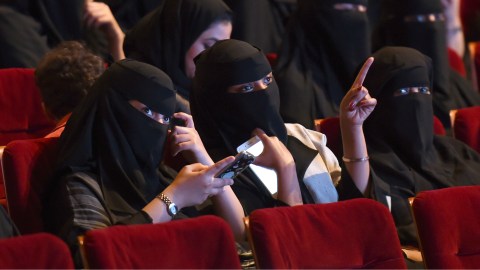Saudi Arabia to end its 35-year cinema ban with screening of ‘Black Panther’

A new movie theater in Saudi Arabia will screen Black Panther on April 18, marking the first commercial movie shown in the country since it banned cinemas 35 years ago.
The Disney blockbuster will receive a gala premiere at an AMC-branded cinema located in a financial district of the country’s capital city of Riyadh.
“It is big news with global significance,” AMC CEO Adam Aron told journalists following the announcement, adding that he thinks the new theater, which is set in a former symphony hall and has more than 500 leather seats, will be the prettiest in the world.
Saudi Arabia, an absolute monarchy with 32 million citizens, began closing its cinemas after adopting an ultraconservative interpretation of Islam in 1979. But since oil prices dropped in 2014, the country has been looking for ways to boost and diversify its economy, with a particular focus on entertainment and technology.
In 2017, the Saudi government announced it would allow AMC, the world’s largest movie theater chain, to open 40 cinemas across the country over the next five years. By 2030, the country hopes to open about 350 cinemas that could earn an annual $1 billion at box offices and create 30,000 permanent jobs.

Screenshot from Disney’s Black Panther
“The restoration of cinemas will…help boost the local economy by increasing household spending on entertainment while supporting job creation,” Saudi Arabia’s culture minister Awwad Alawwad said.
The reopening of cinemas in Saudi Arabia is part of broader liberalization movement that’s gained momentum since 32-year-old Mohammed bin Salman was named crown prince in 2017. Over the past year, Saudi Arabia has relaxed restrictions on public concerts, lifted the ban on women driving, curbed the power of clerics, and launched an anti-corruption campaign that’s resulted in the arrest of scores of officials and business elites.
Still, Saudi Arabia’s social norms and policy remain ultraconservative. The tickets to a recent public concert, which was segregated by gender, warned that “Dancing is strictly prohibited” – as was “swaying.” And earlier this year, the country’s highest-ranking religious official, Abdulaziz Al Sheikh, publicly opposed the restoration of cinemas, suggesting the “depravity” of commercial movies would corrupt morals in the country.
He might not need to worry: Saudi Arabia’s Ministry of Culture has promised movies will be censored to fall “in line with values and principles in place and do not contradict with Sharia Laws and moral values in the Kingdom.”





